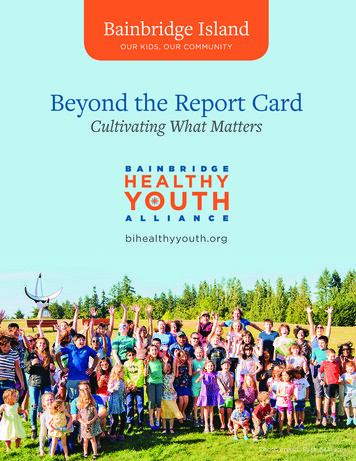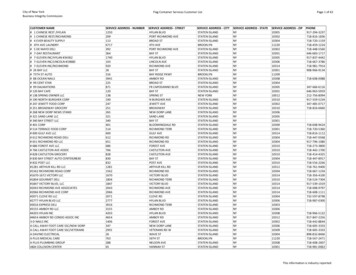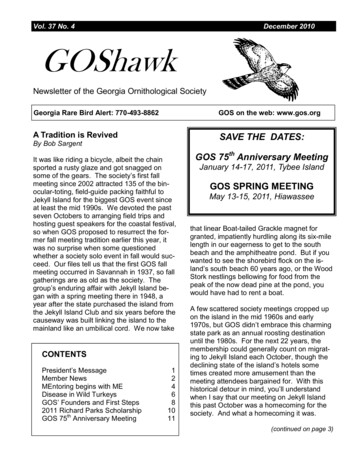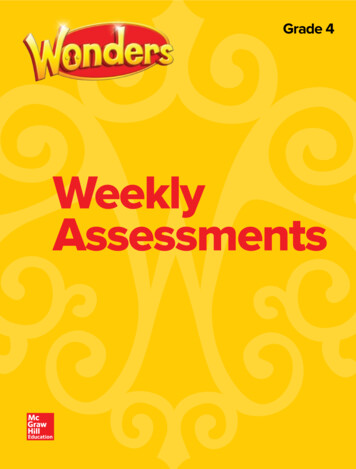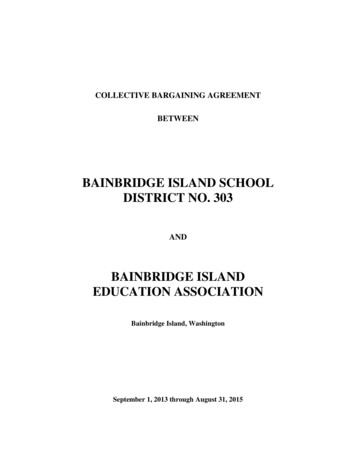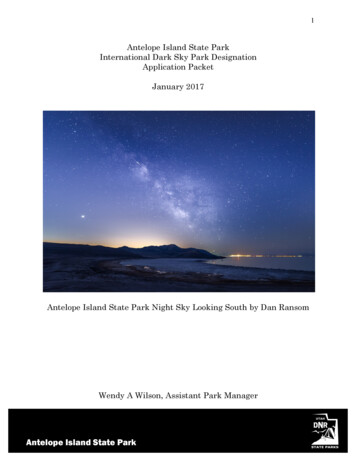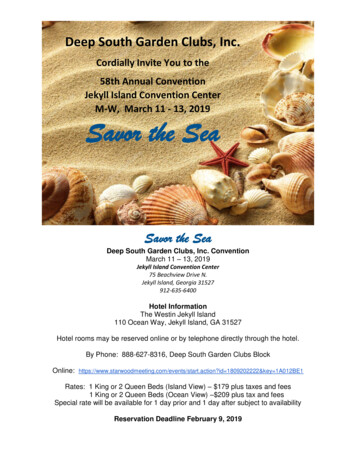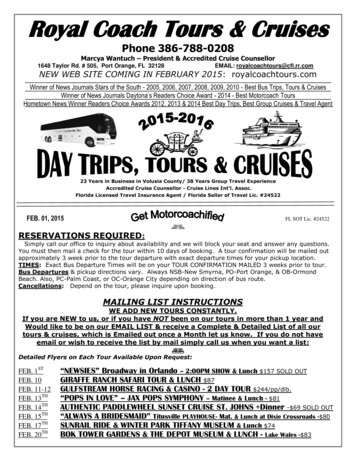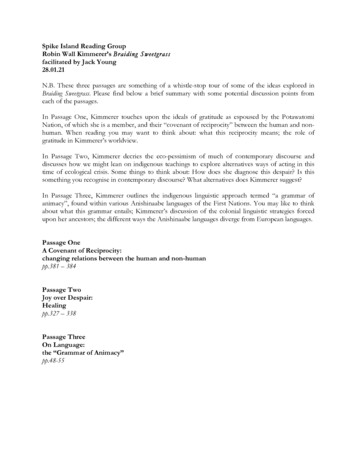
Transcription
Spike Island Reading GroupRobin Wall Kimmerer’s Braiding Sweetgrassfacilitated by Jack Young28.01.21N.B. These three passages are something of a whistle-stop tour of some of the ideas explored inBraiding Sweetgrass. Please find below a brief summary with some potential discussion points fromeach of the passages.In Passage One, Kimmerer touches upon the ideals of gratitude as espoused by the PotawatomiNation, of which she is a member, and their “covenant of reciprocity” between the human and nonhuman. When reading you may want to think about: what this reciprocity means; the role ofgratitude in Kimmerer’s worldview.In Passage Two, Kimmerer decries the eco-pessimism of much of contemporary discourse anddiscusses how we might lean on indigenous teachings to explore alternatives ways of acting in thistime of ecological crisis. Some things to think about: How does she diagnose this despair? Is thissomething you recognise in contemporary discourse? What alternatives does Kimmerer suggest?In Passage Three, Kimmerer outlines the indigenous linguistic approach termed “a grammar ofanimacy”, found within various Anishinaabe languages of the First Nations. You may like to thinkabout what this grammar entails; Kimmerer’s discussion of the colonial linguistic strategies forcedupon her ancestors; the different ways the Anishinaabe languages diverge from European languages.Passage OneA Covenant of Reciprocity:changing relations between the human and non-humanpp.381 – 384Passage TwoJoy over Despair:Healingpp.327 – 338Passage ThreeOn Language:the “Grammar of Animacy”pp.48-55
PASSAGE ONE
382epiloguenew toy truck, already tired of it. His dad makes him pick it up andthen sits him down. A gift is different from something you buy, possessed of meaning outside its material boundaries. You never dishonorthe gift. A gift asks something of you. To take care of it. And something more.I don’t know the origin of the giveaway, but I think that we learnedit from watching the plants, especially the berries who offer up their giftsall wrapped in red and blue. We may forget the teacher, but our language remembers: our word for the giveaway, minidewak, means “theygive from the heart.” At the word’s center lives the word min. Min is aroot word for gift, but it is also the word for berry. In the poetry of ourlanguage, might speaking of minidewak remind us to be as the berries?The berries are always present at our ceremonies. They join us ina wooden bowl. One big bowl and one big spoon, which are passedaround the circle, so that each person can taste the sweetness, remember the gifts, and say thank you. They carry the lesson, passed to us byour ancestors, that the generosity of the land comes to us as one bowl,one spoon. We are all fed from the same bowl that Mother Earth hasfilled for us. It’s not just about the berries, but also about the bowl.The gifts of the earth are to be shared, but gifts are not limitless. Thegenerosity of the earth is not an invitation to take it all. Every bowl hasa bottom. When it’s empty, it’s empty. And there is but one spoon, thesame size for everyone.How do we refill the empty bowl? Is gratitude alone enough?Berries teach us otherwise. When berries spread out their giveawayblanket, offering their sweetness to birds and bears and boys alike, thetransaction does not end there. Something beyond gratitude is asked ofus. The berries trust that we will uphold our end of the bargain anddisperse their seeds to new places to grow, which is good for berriesand for boys. They remind us that all flourishing is mutual. We needthe berries and the berries need us. Their gifts multiply by our care forthem, and dwindle from our neglect. We are bound in a covenant ofreciprocity, a pact of mutual responsibility to sustain those who sustainus. And so the empty bowl is filled.Somewhere along the line, though, people have abandoned berry
epilogue383teachings. Instead of sowing richness, we diminish the possibilities forthe future at every turn. But the uncertain path to the future couldbe illuminated by language. In Potawatomi, we speak of the land asemingoyak: that which has been given to us. In English, we speak ofthe land as “natural resources” or “ecosystem services,” as if the lives ofother beings were our property. As if the earth were not a bowl of berries, but an open pit mine, and the spoon a gouging shovel.Imagine that while our neighbors were holding a giveaway, someone broke into their home to take whatever he wanted. We would beoutraged at the moral trespass. So it should be for the earth. The earthgives away for free the power of wind and sun and water, but insteadwe break open the earth to take fossil fuels. Had we taken only thatwhich is given to us, had we reciprocated the gift, we would not haveto fear our own atmosphere today.We are all bound by a covenant of reciprocity: plant breath foranimal breath, winter and summer, predator and prey, grass and fire,night and day, living and dying. Water knows this, clouds know this.Soil and rocks know they are dancing in a continuous giveaway ofmaking, unmaking, and making again the earth.Our elders say that ceremony is the way we can remember to remember. In the dance of the giveaway, remember that the earth is agift that we must pass on, just as it came to us. When we forget, thedances we’ll need will be for mourning. For the passing of polar bears,the silence of cranes, for the death of rivers and the memory of snow.When I close my eyes and wait for my heartbeat to match thedrum, I envision people recognizing, for perhaps the first time, thedazzling gifts of the world, seeing them with new eyes, just as theyteeter on the cusp of undoing. Maybe just in time. Or maybe too late.Spread on the grass, green over brown, they will honor at last the giveaway from Mother Earth. Blankets of moss, robes of feathers, basketsof corn, and vials of healing herbs. Silver salmon, agate beaches, sanddunes. Thunderheads and snowdrifts, cords of wood and herds of elk.Tulips. Potatoes. Luna moths and snow geese. And berries. More thananything, I want to hear a great song of thanks rise on the wind. Ithink that song might save us. And then, as the drum begins, we will
384epiloguedance, wearing regalia in celebration of the living earth: a waving fringeof tallgrass prairie, a whirl of butterfly shawls, with nodding plumes ofegrets, jeweled with the glitter of a phosphorescent wave. When the songpauses for the honor beats, we’ll hold high our gifts and ululate theirpraises, a shining fish, a branch of blossoms, and a starlit night.The moral covenant of reciprocity calls us to honor our responsibilities for all we have been given, for all that we have taken. It’s our turnnow, long overdue. Let us hold a giveaway for Mother Earth, spreadour blankets out for her and pile them high with gifts of our own making. Imagine the books, the paintings, the poems, the clever machines,the compassionate acts, the transcendent ideas, the perfect tools. Thefierce defense of all that has been given. Gifts of mind, hands, heart,voice, and vision all offered up on behalf of the earth. Whatever ourgift, we are called to give it and to dance for the renewal of the world.In return for the privilege of breath.
PASSAGE TWO
PASSAGE THREE
Robin Wall Kimmerer's Braiding Sweetgrass facilitated by Jack Young 28.01.21 N.B. These three passages are something of a whistle-stop tour of some of the ideas explored in Braiding Sweetgrass. Please find below a brief summary with some potential discussion points from each of the passages.
